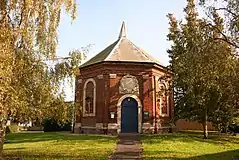Moulton Chapel
Moulton Chapel is a village in the South Holland district of Lincolnshire, England. It is on the B1357 road, 4 miles (6 km) south from Moulton, 5 miles (8 km) south-west from Holbeach and 4 miles south-east from Spalding. The village is in the civil parish of The Moultons where the population was 3,504 at the 2011 census.[1]
| Moulton Chapel | |
|---|---|
 St James', Moulton Chapel | |
 Moulton Chapel Location within Lincolnshire | |
| Population | 3,504 (2011) |
| OS grid reference | TF294182 |
| • London | 85 mi (137 km) S |
| Civil parish |
|
| District | |
| Shire county | |
| Region | |
| Country | England |
| Sovereign state | United Kingdom |
| Post town | SPALDING |
| Postcode district | PE12 |
| Dialling code | 01406 |
| Police | Lincolnshire |
| Fire | Lincolnshire |
| Ambulance | East Midlands |
| UK Parliament | |
History
In 1885 Kelly's Directory noted Moulton Chapel as a chapelry of Moulton, with a small octagonal chapel, erected in 1722. The living was a perpetual curacy.[2]
The 1722 chapel of St James, by William Sands senior of Spalding, was a rebuild of an earlier chapel, and was enlarged in 1886. In 1896 Moulton Chapel became a separate ecclesiastical parish under the name of Moulton St James.[3] Pevsner notes the church as a red-brick octagon with a chancel added in 1886, and a domed interior. The style is Dutch, influenced by late 17th-century fen drainers. There is a marble font, and a west gallery probably from the 19th century.[4] St James' is a Grade II* listed building.[5]
With St James', on Roman Road, is a Grade II listed 1865 red-brick tower windmill.[6]
In the late 1820s Thomas Nutt of Moulton Chapel developed and patented an improvement to beehives that allowed for heat regulation through improved ventilation, helped to prevent swarming, and encouraged bees to occupy other adjacent hives, thereby obviating the need to destroy bees in the collection of honey. The better welfare of bees produced a greater honey yield.[7][8][9][10] Nutt laid out his invention in his 1832 book Humanity to Honey Bees[11]
Education
Moulton Chapel Primary School has National Healthy Schools Status and belongs to the Schools Sports Partnership. Its 2016 Ofsted Inspection judgement rated the school as 'Grade 2 Good' for overall effectiveness.[12]
References
- "Civil Parish population 2011". Neighbourhood Statistics. Office for National Statistics. Retrieved 24 May 2016.
- Kelly's Directory of Lincolnshire with the port of Hull 1885, p. 584
- Cox, J. Charles (1916) Lincolnshire p. 233; Methuen & Co. Ltd.
- Pevsner, Nikolaus; Harris, John; The Buildings of England: Lincolnshire p. 608; Penguin, (1964); revised by Nicholas Antram (1989), Yale University Press. ISBN 0300096208
- Historic England. "Chapel of St James, Roman Road (1359293)". National Heritage List for England. Retrieved 3 June 2012.
- Historic England. "Windmill, Roman Road (1064467)". National Heritage List for England. Retrieved 3 June 2012.
- Hebert, Luke (1836); The Engineer's and Mechanic's Encyclopaedia, Volume 1, Thomas Kelly, Paternoster Row, London, p. 162; reprinted February 2010. ISBN 1145467415
- Timms, John (1830); Arcana of Science and Art, Or, An Annual Register of Useful Inventions and Improvements, Discoveries; John Limbird p. 21; reprinted BiblioBazaar (2009). ISBN 1110719124
- The London Literary Gazette and Journal of Belles Lettres, Arts, Sciences, Etc (1833), p. 21; reprinted 2010. ISBN 114979920X
- Hebert, Luke (1829); The Register of arts, and journal of patent inventions, Volume 3, B. Steill, Paternoster Row, London, p. 228; reprinted BiblioBazaar (2010). ISBN 1143777514
- Nutt, Thomas (1832); Humanity To Honey Bees: Or Practical Directions For The Management Of Honey Bees Upon An Improved And Humane Plan; J. Leach, Wisbeach; reprinted Kessinger Publishing Co (2009). ISBN 1104181096
- (PDF)"Moulton Chapel Primary School"; Ofsted Inspection 2012. Retrieved 3 June 2012
External links
![]() Media related to Moulton Chapel at Wikimedia Commons
Media related to Moulton Chapel at Wikimedia Commons
- "Moulton"; Genuki.org.uk. Retrieved 3 June 2012
- "Moulton Chapel Primary School"; Retrieved 3 June 2012
- "Moulton Chapel Lincolnshire"; A Vision of Britain through Time. Retrieved 3 June 2012
- "Fast End to a Ring Career"; The Milwaukee Journal, 21 May 1966. Retrieved 3 June 2012